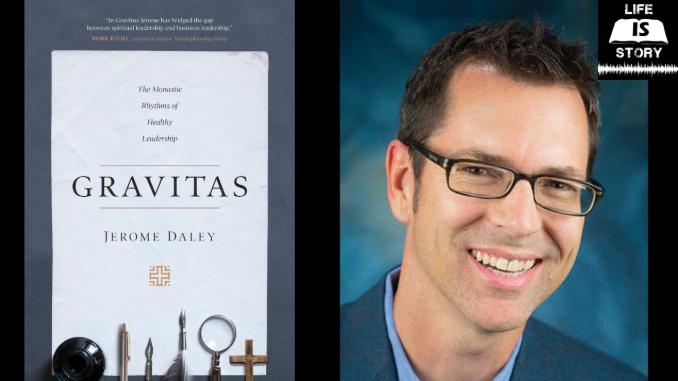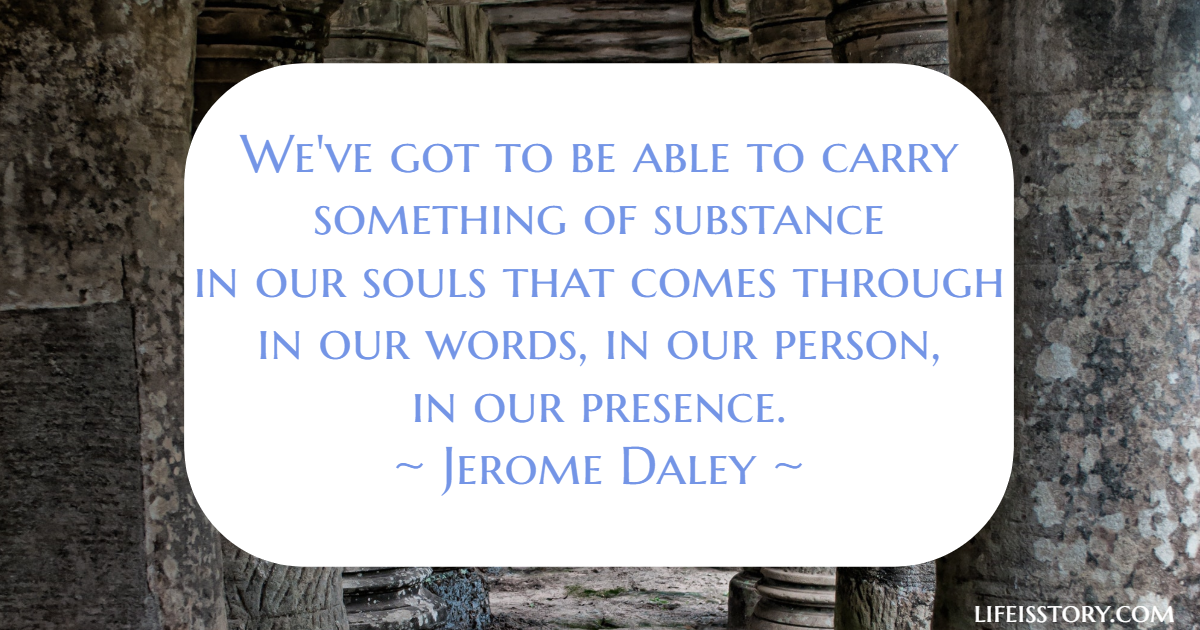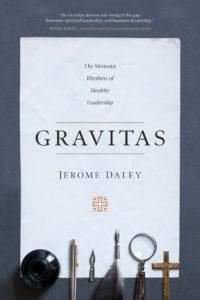
Podcast: Play in new window | Download
Subscribe: Apple Podcasts | RSS
What do you think of when you hear the term “monastic rhythm”? Is it all chanting in Latin, burlap robes, and communal living in the medieval times? Or is there something from the Benedictines we can learn from today? Jerome Daley certainly believes so and he’s made these rhythms a way of life and leadership. Whether you are in secular or religious leadership, it’s time to consider if our current practices lead to the rootedness, security, and hope in Christ we long for. Gravitas is a call to change business-as-usual into something holy.
The Interview | Gravitas: The Monastic Rhythms of Healthy Leadership
This excerpt has been lightly edited for brevity and clarity. You can listen to the full interview by clicking the play button above or subscribing at Apple Podcasts, Stitcher, Spotify, or wherever you listen to podcasts.
Josh Olds: So let’s just start, I guess, with the overall concept. What do you mean by monastic rhythms?
Jerome Daley: Well, I’ve been intrigued in recent years by monastic communities like the Benedictines—that particular community is the one that I have drawn on for this book—and the things that have been important to them for the last 1500 years. I mean, our lives are far removed from any kind of monastery, right? But these were, and are—continue to be—communities that have been all about going deep in God. And then living out of that out of that life, having that overflow into the work that they do in their communities.
You know, I have been aware in my own life and in the lives of leaders that I coach, that there is a just a deep hunger for, for some spiritual weight in their lives. I use the word authority, but I have to qualify it because it’s not positional authority. It’s like this integrity of character, that that I think we need now more than ever, if, if we’re people are looking to us to be trustworthy leaders. You know, we need more than a nameplate on the door, or some title behind our name. We’ve got to be able to carry something of substance in our souls that comes through in our words, in our person in our presence…So that sort of led me to exploring the monastic tradition.
Josh Olds: So I feel like the difficulty that you might have with people who are unfamiliar with any of this is that they hear monastic tradition. And they’re thinking medieval age monks, they’re thinking, chanting and Latin. They’re thinking wearing burlap. How do we pull ourselves into the modern times from the typical conception that people have?
Jerome Daley: Yeah, I get it. And you know, some of those stereotypes probably have some roots of truth to them, if you go back far enough and would feel completely foreign to our world today. So what I’ve tried to do, Josh, to get underneath that more superficial layer…And so these things have remained true from, you know, roughly 600 AD when St. Benedict first started this community, all the way up to the modern days. These principles and practices have really been truly timeless. So that’s where I’ve dug in to find something that might actually speak to our lives now.

Josh Olds: I feel like the second thing that people are like, okay, you know, I’m not, I’m not wearing a robe to work or, you know, whatever. But the next, the next criticism that I feel like I would hear is just like I’m too busy for that. How do you respond to something like that?
Jerome Daley: Well, people are too busy we are. That’s why we need this so much. I mean, we are pathologically busy. We work and live at a pace that is largely unsustainable. It is deeply unhealthy, both to our souls, and our relationships, and our spirituality. I mean, there’s no part of our lives that aren’t just a little bit toxic because of the culture that we live in.
Now, this is the only culture we have so this is where we’re called to show up, but I’m reaching for ways—personally for me—how can I show up in a healthier way. Because if I’m as frantic and overwhelmed and harried as those that I’m living around and leading, I’m not gonna be much good, honestly…The name of the book is the word I’m using for that sense of rootedness, that sense of carrying substance. You know, the word Gravitas? Gravitas comes from the word we get gravity from, you know, as a sense of weight. And it’s not about being impressive. You know, it’s not about wowing people. It’s just about being quietly winsome, in a way that people recognize that there’s something to that guy or there’s something to that woman.
It reminds me of Peter and John being arrested and tried by the Jewish authorities. These leaders, who are the most educated in their culture, are just marveling that these disciples are carrying what I would now call gravitas. And they’re like, how did these unschooled, untrained guys come to carry such spiritual authority? And all they need to say is “They hung out with Jesus.” And so, if you really want to get to the bottom line of this book, it’s all about hanging out with Jesus.
The Book | Gravitas: The Monastic Rhythms of Healthy Leadership
 Are you feeling weary? Overwhelmed by the scope of your leadership? Do you wonder where your work is taking you or what it’s all for?
Are you feeling weary? Overwhelmed by the scope of your leadership? Do you wonder where your work is taking you or what it’s all for?
You’re not alone. Every generation reaches a point of rude awakening where what is demanded of us is more than what is given us. What we’ve been prepared for isn’t what we’re facing. What we’ve been taught is the good life really isn’t.
Jerome Daley points us to ancient wisdom that long ago exposed the limits of celebrity and achievement cults: the monastic tradition. It offers not only meaning and a critique of values antithetical to a good life, but also ways of living and leading that will fill you up and dramatically increase your impact. Your leadership is meant for more; Gravitas will help you find the path.
The Author | Jerome Daley
 Jerome Daley is an executive coach and retreat guide who is passionate about helping leaders thrive in their souls and their organizational cultures. With over 20 years in people development, he speaks, trains, and mentors people toward their true identity and authentic influence.
Jerome Daley is an executive coach and retreat guide who is passionate about helping leaders thrive in their souls and their organizational cultures. With over 20 years in people development, he speaks, trains, and mentors people toward their true identity and authentic influence.
Making his home in the mountains of North Carolina, he and his wife Kellie are parents of three grown children. His great delights are taking spiritual retreats, drinking good wine, backpacking in the mountains, and playing with his grandson.
